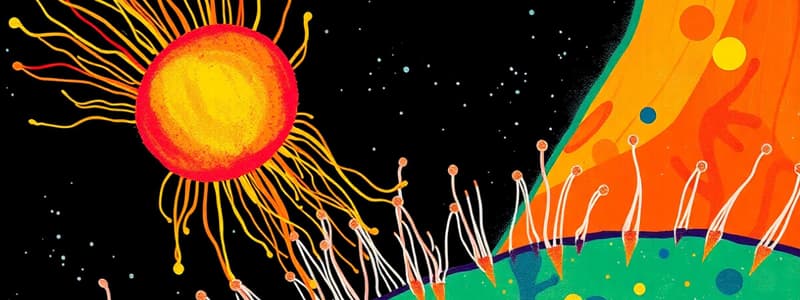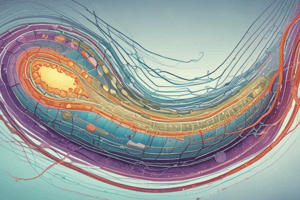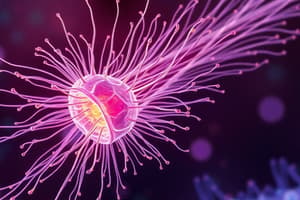Podcast
Questions and Answers
Flagella propel cells through ______.
Flagella propel cells through ______.
liquid
Cilia move material across the surface of ______.
Cilia move material across the surface of ______.
cells
Many interphase cells contain a non-motile primary ______.
Many interphase cells contain a non-motile primary ______.
cilium
Centrioles can nucleate primary cilium or spindle ______.
Centrioles can nucleate primary cilium or spindle ______.
Mitosis in an animal cell involves the formation of ______ spindles.
Mitosis in an animal cell involves the formation of ______ spindles.
DNA condenses into ______ during mitosis.
DNA condenses into ______ during mitosis.
The ______ envelope breaks down during mitosis.
The ______ envelope breaks down during mitosis.
Kinetochore microtubules are responsible for ______ chromosomes to spindle poles.
Kinetochore microtubules are responsible for ______ chromosomes to spindle poles.
Microtubule dynamics are enhanced during ______.
Microtubule dynamics are enhanced during ______.
The duplication of Microtubule Organising Centres leads them to move to opposite ______.
The duplication of Microtubule Organising Centres leads them to move to opposite ______.
Equal tension must be applied to each side of the ______ before chromatid separation can proceed.
Equal tension must be applied to each side of the ______ before chromatid separation can proceed.
Microtubules attach to ______ during cell division.
Microtubules attach to ______ during cell division.
The spindle checkpoint proteins, such as ______ and ______, are important for preventing premature chromatid separation.
The spindle checkpoint proteins, such as ______ and ______, are important for preventing premature chromatid separation.
Haploinsufficiency of ______ increases cancer frequency in mice.
Haploinsufficiency of ______ increases cancer frequency in mice.
Cytokinesis is driven by ______ based myosin contraction.
Cytokinesis is driven by ______ based myosin contraction.
______ motors are responsible for spindle elongation and chromatids movement during anaphase.
______ motors are responsible for spindle elongation and chromatids movement during anaphase.
Organelles segregate along cytoskeletal ______ to ensure both daughter cells inherit necessary components.
Organelles segregate along cytoskeletal ______ to ensure both daughter cells inherit necessary components.
Chromosome movement and spindle pole separation occur during ______.
Chromosome movement and spindle pole separation occur during ______.
Mutations in ______ are frequently associated with various types of tumors and leukemia.
Mutations in ______ are frequently associated with various types of tumors and leukemia.
Spindle elongation during ______ is essential for chromosome separation.
Spindle elongation during ______ is essential for chromosome separation.
What is the primary function of cilia in biological systems?
What is the primary function of cilia in biological systems?
Which of the following correctly describes a role of flagella?
Which of the following correctly describes a role of flagella?
What structural feature primarily defines centrioles?
What structural feature primarily defines centrioles?
What occurs to microtubules during mitosis?
What occurs to microtubules during mitosis?
What happens during the breakdown of the nuclear envelope?
What happens during the breakdown of the nuclear envelope?
The intrinsic mechanism that guides chromosomes to spindle poles is primarily through what type of microtubules?
The intrinsic mechanism that guides chromosomes to spindle poles is primarily through what type of microtubules?
What term describes the phase of the cell cycle when DNA condenses into chromosomes?
What term describes the phase of the cell cycle when DNA condenses into chromosomes?
Which of these events is a characteristic feature of mitotic spindle formation?
Which of these events is a characteristic feature of mitotic spindle formation?
How do Microtubule Organising Centres (MTOCs) relate to the cell cycle?
How do Microtubule Organising Centres (MTOCs) relate to the cell cycle?
What role do cyclin-dependent kinases play in cell division?
What role do cyclin-dependent kinases play in cell division?
What role do spindle checkpoint proteins play in cell division?
What role do spindle checkpoint proteins play in cell division?
What is the effect of haploinsufficiency of BubR1 in mice?
What is the effect of haploinsufficiency of BubR1 in mice?
What structure is essential for maintaining attachment to microtubules during chromosome separation?
What structure is essential for maintaining attachment to microtubules during chromosome separation?
Which proteins are specifically associated with chromosomal instability rather than tumor predisposition?
Which proteins are specifically associated with chromosomal instability rather than tumor predisposition?
Which process drives cytokinesis in cell division?
Which process drives cytokinesis in cell division?
What happens to the spindle during anaphase B?
What happens to the spindle during anaphase B?
What is a common result of mutations in Mad 2?
What is a common result of mutations in Mad 2?
What is the function of microtubule motors during cell division?
What is the function of microtubule motors during cell division?
Which sequence of events occurs during cytokinesis?
Which sequence of events occurs during cytokinesis?
Which of the following is NOT a consequence of chromosomal instability?
Which of the following is NOT a consequence of chromosomal instability?
Flashcards
Cilia function
Cilia function
Move materials across the surface of cells.
Flagella function
Flagella function
Propel cells through liquid.
Microtubule structure
Microtubule structure
Hollow tubes composed of protein subunits.
Microtubule function
Microtubule function
Signup and view all the flashcards
Centrosome function
Centrosome function
Signup and view all the flashcards
Mitosis stages
Mitosis stages
Signup and view all the flashcards
Kinetochore microtubules
Kinetochore microtubules
Signup and view all the flashcards
Centrioles and primary cilium
Centrioles and primary cilium
Signup and view all the flashcards
Mitotic spindle
Mitotic spindle
Signup and view all the flashcards
Microtubule dynamics
Microtubule dynamics
Signup and view all the flashcards
Kinetochore attachment
Kinetochore attachment
Signup and view all the flashcards
Spindle checkpoint
Spindle checkpoint
Signup and view all the flashcards
Premature Chromatid Separation (PCS) syndrome
Premature Chromatid Separation (PCS) syndrome
Signup and view all the flashcards
Aneuploidy
Aneuploidy
Signup and view all the flashcards
Microtubule motors
Microtubule motors
Signup and view all the flashcards
Kinetochore
Kinetochore
Signup and view all the flashcards
Anaphase B
Anaphase B
Signup and view all the flashcards
Cytokinesis
Cytokinesis
Signup and view all the flashcards
Actin/Myosin
Actin/Myosin
Signup and view all the flashcards
Organelle Inheritance
Organelle Inheritance
Signup and view all the flashcards
Flagella: Movement?
Flagella: Movement?
Signup and view all the flashcards
Cilia: Movement?
Cilia: Movement?
Signup and view all the flashcards
What makes up a cilium?
What makes up a cilium?
Signup and view all the flashcards
Microtubule function in cells
Microtubule function in cells
Signup and view all the flashcards
Centrioles: Role in cell division?
Centrioles: Role in cell division?
Signup and view all the flashcards
What is a microtubule organizing center?
What is a microtubule organizing center?
Signup and view all the flashcards
Stages of mitosis
Stages of mitosis
Signup and view all the flashcards
How do chromosomes attach during mitosis?
How do chromosomes attach during mitosis?
Signup and view all the flashcards
What are kinetochore microtubules?
What are kinetochore microtubules?
Signup and view all the flashcards
Relationship between centrosomes and the cell cycle
Relationship between centrosomes and the cell cycle
Signup and view all the flashcards
What happens before chromatid separation?
What happens before chromatid separation?
Signup and view all the flashcards
Spindle checkpoint proteins
Spindle checkpoint proteins
Signup and view all the flashcards
Mad2 & Mad1
Mad2 & Mad1
Signup and view all the flashcards
BubR1
BubR1
Signup and view all the flashcards
Bub3
Bub3
Signup and view all the flashcards
Actin and Myosin
Actin and Myosin
Signup and view all the flashcards
Study Notes
Cell Shape and Movement: Cilia, Flagella & Mitosis
- Microtubule Structure and Function: Cilia and flagella are important for cell movement. They are composed of microtubules.
- Cilia: Move materials across the surface of cells. Example: ciliated epithelium.
- Flagella: Propel cells through liquid. Example: sperm and Chlamydomonas.
- Cilia and Flagella Structure: Composed of microtubules arranged in a 9 + 2 pattern. Nine outer doublets and two central microtubules.
- Dynein Arms: Protein motors that drive the movement of cilia and flagella by causing sliding of microtubules. Power stroke and recovery stroke are two parts of dynein action. Dynein arms generate the movement of the cilia/flagella.
- Microtubule Arrangement: The 9 + 2 structure of cilia and flagella is seen in cross-sections.
- Basal Body: The base of cilia or flagella, similar in structure to centrioles, and is essential for their development.
- Centriole Structure: 9 triplet microtubules arranged in a ring structure. Part of the cytoskeleton.
- Microtubule Dynamics: Microtubules are dynamic structures that can grow and shrink. This dynamic growth and shrinkage is important for the function of cilia/flagella.
Mitosis
- Mitosis: Cell division process in which a single cell produces two identical daughter cells.
- Cell Cycle: Ordered series of events that occur from cell formation to cell division. Stages include G1, S, G2, mitosis, cytokinesis.
- Checkpoint Control Important for monitoring and regulating stages of the cell cycle to prevent errors.
- Mitosis Phases: Interphase, Prophase, Prometaphase, Metaphase, Anaphase, Telophase, Cytokinesis.
- Interphase: The phase before mitosis, characterized by cell growth, DNA replication, and protein synthesis
- Prophase: Chromosomes condense, spindle formation begins
- Prometaphase: The nuclear envelope breaks down, microtubules attach to kinetochores.
- Metaphase: Chromosomes align at the metaphase plate.
- Anaphase: Sister chromatids separate and move to opposite poles.
- Telophase: Chromosomes decondense, nuclear envelope forms around each set of chromosomes
- Cytokinesis: Cytoplasm divides, creating two separate daughter cells.
- Organelle Inheritance: Organelles are distributed to each daughter cell during mitosis.
- Cytokinesis and Actin-Myosin Contraction: A contractile ring of actin and myosin proteins forms at the equator of the cell to pinch the cell in two during cytokinesis. For cells that do not have a cell wall, like animal cells.
- Centrosome Duplication: The duplication of the centrosome is essential for the proper formation of a mitotic spindle for mitosis.
- Microtubules (MTs): Important components of the mitotic spindle, connecting centrosomes to chromosomes.
- Three distinct classes of Microtubules: Kinetochore MTs, Astral MTs, Interpolar MTs, each having diverse roles in aligning and separating chromosomes.
- Kinetochore MTs: Attach to the kinetochore, essential to move chromosomes.
- Astral MTs: Extend to surrounding cytoplasm, important for positioning the spindle apparatus, and for chromosome positioning.
- Interpolar MTs: Connect the two spindle poles. Contribute to spindle length, structure and separation.
- Spindle Checkpoint Proteins: Regulates the cell cycle, ensuring that all chromosomes are correctly attached to the mitotic spindle before sister chromatids separate, preventing chromosome missegregation
- DNA Condensation in Mitosis: DNA coils tightly and compactly to form chromosomes that can move efficiently, during mitosis and meiosis.
- Nuclear Envelope Breakdown: The breakdown of the nuclear envelope allows microtubules to access chromosomes for proper segregation.
- Kinetochore Micro tubule Attachment: Kinetochores attach to kinetochore microtubules and are critical for chromosome segregation.
Studying That Suits You
Use AI to generate personalized quizzes and flashcards to suit your learning preferences.




